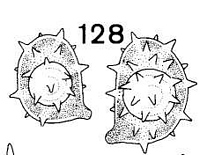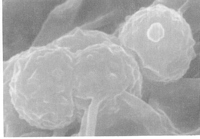|
 Ramariopsis avellaneoinversa Ramariopsis avellaneoinversa
BiostatusPresent in region - Indigenous. Endemic
Images (click to enlarge)
Caption: Fig. 128. Ramariopsis avellaneo-inversa. TENN no. 43504. | 
Caption: Fig. 140. Ramariopsis avellaneo-inversa x7800. TENN no. 43504. |
Article: Petersen, R.H. (1988). The clavarioid fungi of New Zealand. New Zealand Department of Scientific and Industrial Research, Bulletin 236: 170 pp. Wellington:.
Description: Fruit bodies up to 35 x 20 mm, branched from the base, up to 3 mm thick at the
thickest place (and therefore considered somewhat more fleshy than most taxa in
the complex). Stipe up to 4.2 mm long, terete, branched almost from the base, off-white
where protected, pale dull grey upward ("tilleul buff"); branches
dichotomous, in 1-2 ranks, terete, "avellaneous", thickest below ultimate
dichotomy; axils lunate; internodes diminishing gradually. Apices concolourous
with branches, awl-shaped. Odour and taste negligible.
Macrochemical reaction: FCL = quickly black, with very little green phase.
Tramal hyphae of branches 2.5-8 µm diam., hyaline, clamped, strictly parallel,
tightly packed, adherent, of relatively short cells. Subhymenium extensive, of
crushed tortuous, uninflated hyphae. Hymenium thickening significantly; basidia
20-25 x 4-5 µm, cylindrical, clamped; contents minutely multiguttulate when
mature; sterigmata 4, spindly, slender, erect. Spores (Figs 128,140) 4-5 x 2.9-3.6
µm (E =1.22-1.56; Em =1.38; Lm = 4.36 µm), ovate to ellipsoid, thin-walled,
hyaline, roughened; contents homogeneous to uniguttulate; hilar appendix
papillate; ornamentation of thickly scattered spines and prickles of variable
length.
Habitat: On tree fern debris on clay bank.
Notes: COMMENTARY: The distinguishing characters of Ramariopsis avellaneo-inversa
are (i) colour pattern of fruit body is the reverse of that of R. avellanea; (ii)
conspicuously roughened spores; (iii) ellipsoid spores; and (iv) dramatic colour
change in FCL. All but (iii) are different from those of R. avellanea, with which it
would be mosr easily confused.
|